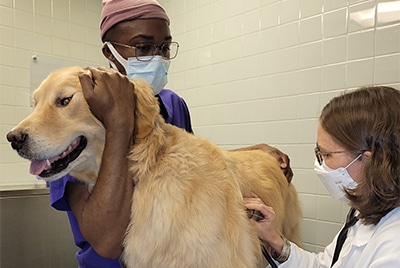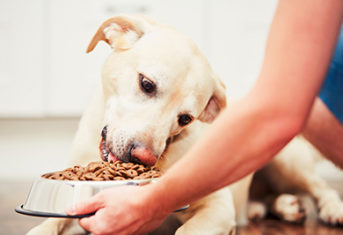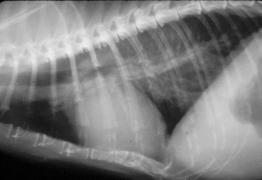Understanding the FDA Update on Non-Hereditary Dilated Cardiomyopathy (DCM) in Dogs

Understanding the FDA Update on Non-Hereditary Dilated Cardiomyopathy (DCM) in Dogs
In July 2018, the United States Food and Drug Administration (FDA) began investigating reports of canine dilated cardiomyopathy (DCM) in dogs eating certain pet foods, many labeled as “grain-free” and containing a high proportion of peas, lentils, other legume seeds (pulses), and/or potatoes in various forms. While the FDA and veterinary scientists have yet to pinpoint the underlying mechanism of non-hereditary DCM, also known as diet-related DCM, the FDA did just update their DCM case numbers, and the topic is in the news again. To help readers understand this complicated issue, this blogpost will focus on many of the unfamiliar terms used in the FDA reports.
Heart Disease is Not the Same in Dogs and Cats
Veterinarians often say, “Cats are not small dogs.” When we say this, we mean that the same disease can look very different in the two species. Heart disease is a good example of that dichotomy. Both dogs and cats develop congestive heart failure. In dogs, leaky heart valves are the most common form of heart disease leading to congestive heart failure, while cats most commonly develop cardiomyopathy, an abnormality of their heart muscle.
Cardiomyopathy in Dogs and Cats
Cardiomyopathy refers to a disorder of the heart muscle (cardio = heart, myopathy = muscle disorder), leading to weakness and poor function. When the heart muscle becomes so weak it no longer effectively pumps blood, fluid builds up in the lungs. The fluid is known as pulmonary edema and the condition is called congestive heart failure. The feline form of cardiomyopathy is hypertrophic cardiomyopathy (HCM). In cats with HCM, the heart muscle becomes very thick. Although uncommon, some dogs develop cardiomyopathy. The canine version of cardiomyopathy is different from the feline version.
Dilated Cardiomyopathy (DCM)
Dogs with DCM develop enlarged hearts with very thin muscles. It is most commonly a hereditary condition in dogs, typically in large or giant breeds, such as the Doberman Pinscher, Great Dane, or the Irish Wolfhound. It is also associated with taurine deficiency in some breeds.
Taurine Deficiency and DCM
Taurine is a sulfur-containing amino acid. Cats deficient in taurine will develop DCM. Nutritional research indicates that taurine is an essential amino acid for cats, but it is generally not considered an essential amino acid for dogs, because dogs are able to synthesize taurine from dietary cysteine and methionine. I say generally not required for dogs because Golden retrievers and American cocker spaniels can develop DCM secondary to taurine deficiency. However, taurine deficiency does not to appear to be the primary cause of the diet-related cardiomyopathy the FDA is investigating.
Grain-Free Diets
Grain-free diets do not contain corn, soy, wheat, rice, barley or other grains. In its 2019 warning to consumers regarding DCM, the FDA labeled grain-free diets as those which “contain a high proportion of peas, lentils, other legume seeds (pulses), and/or potatoes in various forms (whole, flour, protein, etc.) as main ingredients (listed within the first 10 ingredients in the ingredient list, before vitamins and minerals)”. Grain-free diets are often considered non-traditional diets. Since the 2019 FDA warning, the effect of diet on canine heart muscle function has been a topic of intense research.
Canine Heart Research
While the exact cause of diet-related DCM is unknown, a recent study found that healthy dogs eating non-traditional diets had reduced heart muscle function when compared to dogs eating traditional diets.
Another recent study looked at the diets under investigation by the FDA and used a “foodomics analysis” to compare ingredients. Four key ingredients were identified as distinguishing a non-traditional diet from a traditional diet: peas, lentils, chicken/turkey, and rice. According to the study, peas showed the greatest association with non-traditional diets.
In another study published this year, dogs eating non-traditional diets diagnosed with DCM or early heart muscle changes showed improvement in their heart function when their diet was changed to a traditional diet. All this scientific research indicates some as of yet unidentified connection between non-traditional diets and heart muscle function.

What can a pet owner do to protect their dog against DCM?
- If your dog is eating a grain-free or non-traditional diet, talk to your veterinarian and ask if your dog should be referred to a board-certified veterinary cardiologist for an evaluation of heart muscle function. This test is called an echocardiogram.
- When choosing a diet for your dog, follow your veterinarian’s diet recommendations.
- Review and adopt the World Small Animal Association Global Nutrition Committee guidelines for selecting a diet for your pet. Keep in mind the most rigorous test of nutritional adequacy is a feeding trial. Not all foods undergo this type of testing, but the label on the bag or can will indicate the testing method used.
For more reporting on diet-related dilated cardiomyopathy, visit The Canine Review.

































